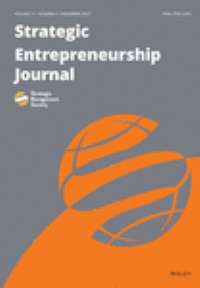The signal of institutional governance in early‐stage financing for university spinoffs
IF 6.3
2区 管理学
Q1 BUSINESS
引用次数: 0
Abstract
Research SummaryUniversity spinoffs (USOs) translate scientific advancement to economic gains, but the role of the university's governance as a public or private institution is infrequently explored. With a novel dataset of academic entrepreneurs with National Science Foundation I‐Corps training, we examine institutional governance as a fundraising signal. We demonstrate how angel investors and venture capitalists (VCs) show a preference for private USOs. However, with different investment objectives, the groups conduct distinct sensemaking that weighs this cue differently. For angels, industry moderates the effect such that they prefer private university life science firms to public USOs. However, industry mediates the effect for VCs, who prefer life sciences to engineering. We describe this variation as mixed salience—when a signal yields differences in decision‐making for distinct audiences.Managerial SummaryUniversity spinoffs (USOs) are important for economic growth, but little is known about differences between USOs from public and private universities. We study how angel investors and venture capitalists (VCs) fund USOs of public and private schools. These two investor groups make funding decisions with different priorities and approaches. Both groups appear to prefer private universities. A deeper look reveals that angel investors prefer private university life science teams to the public university counterparts. On the other hand, VCs prefer life sciences teams to engineering teams—and life sciences teams are more likely to come from private schools. Evidently, the two investor audiences respond to the public/private distinction in different ways.大学分拆早期融资中的制度治理信号
研究总结大学衍生品(USOs)将科学进步转化为经济收益,但大学作为公共或私人机构的治理作用很少被探索。通过美国国家科学基金会I - Corps培训的学术企业家的新数据集,我们研究了机构治理作为筹款信号的作用。我们展示了天使投资者和风险资本家(vc)如何表现出对私人uso的偏好。然而,由于投资目标不同,这些集团会进行不同的意义分析,以不同的方式衡量这一线索。对于天使投资人来说,行业调节了影响,使得他们更喜欢私立大学生命科学公司,而不是上市的uso。然而,行业对风投的影响起中介作用,风投更喜欢生命科学而不是工程。我们将这种变化描述为混合显著性——当一个信号在不同受众的决策中产生差异时。管理总结大学衍生品(USOs)对经济增长至关重要,但人们对公立大学和私立大学衍生品之间的差异知之甚少。我们研究了天使投资者和风险资本家如何资助公立和私立学校的uso。这两个投资者群体以不同的优先级和方式做出投资决策。这两个群体似乎都更喜欢私立大学。更深入的研究表明,与公立大学的生命科学团队相比,天使投资者更喜欢私立大学的生命科学团队。另一方面,比起工程团队,风投更喜欢生命科学团队——而生命科学团队更有可能来自私立学校。显然,这两种投资者对公私区分的反应方式不同。
本文章由计算机程序翻译,如有差异,请以英文原文为准。
求助全文
约1分钟内获得全文
求助全文
来源期刊

Strategic Entrepreneurship Journal
Multiple-
CiteScore
11.10
自引率
1.60%
发文量
31
期刊介绍:
The Strategic Entrepreneurship Journal is a research journal that publishes original work recommended by a developmental, double-blind review process conducted by peer scholars. Strategic entrepreneurship involves innovation and subsequent changes which add value to society and which change societal life in ways which have significant, sustainable, and durable consequences. The SEJ is international in scope and acknowledges theory- and evidence-based research conducted and/or applied in all regions of the world. It is devoted to content and quality standards based on scientific method, relevant theory, tested or testable propositions, and appropriate data and evidence, all replicable by others, and all representing original contributions. The SEJ values contributions which lead to improved practice of managing organizations as they deal with the entrepreneurial process involving imagination, insight, invention, and innovation and the inevitable changes and transformations that result and benefit society.
 求助内容:
求助内容: 应助结果提醒方式:
应助结果提醒方式:


